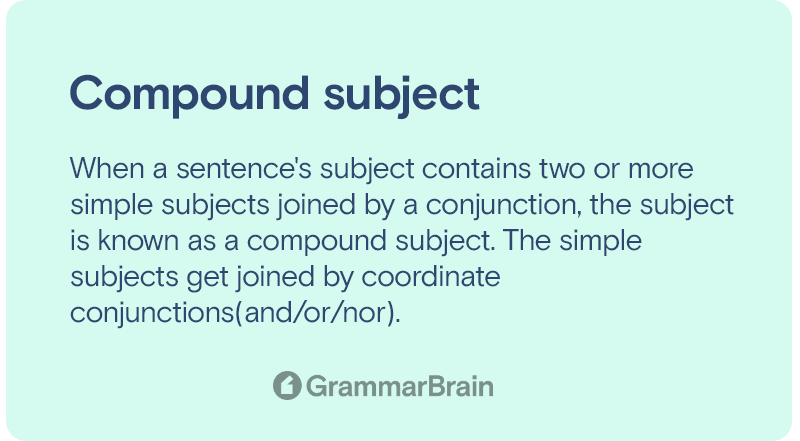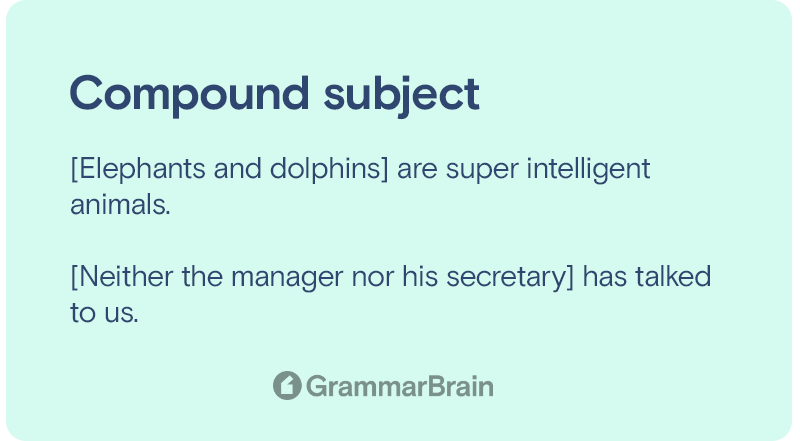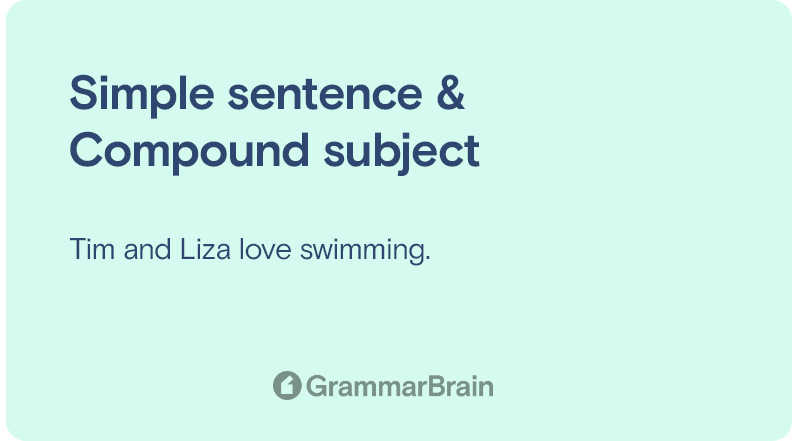What is a compound subject? And how does a compound subject work? Writers can create a compound subject by combining two or more short noun phrases into a single, long noun phrase. The individual phrases get connected by conjunctions. Creating a compound subject.
In this article, you’ll find information and examples of compound subjects.

What is a compound subject?
When a sentence’s subject contains two or more simple subjects joined by a conjunction, the subject is known as a compound subject. The simple subjects get joined by coordinate conjunctions (and/or/nor).
You can use correlative conjunctions (neither/nor and either/or) to connect the simple subjects.
Compound subject definition
A compound subject is a group of two or more pronouns or nouns connected by coordinate or correlative conjunctions. Here is an example sentence:
- Neither Alice nor Debbie likes chicken.
In this sentence, Neither Alice nor Debbie is the compound subject.

Examples of a compound subject
Here are some example sentences having compound subjects:
- Elephants and dolphins are super intelligent animals.
- Neither the manager nor his secretary has talked to us.
- Shelly or mom will bake the cupcakes.
- Fried chips or baked goods are unhealthy.
- Either all of us or none of us go to the party.
- Both your hairbrush and toothbrush need to be changed.
- Neither the red shirt nor the black one has any holes.
- Either dad or mom will pass out if they don’t stop walking fast.
- Either the cakes or cookies has chocolate chips.
- Either Jack or Jill is going to go with us to the market.
- Either the white kitten or the black puppy is getting adopted.
- Everything in the car and the box needs to come into our building.
Understanding compound subject and predicate
A sentence with a compound subject has multiple simple objects. More than one predicates in a sentence form a compound predicate.
A compound predicate has two or more verbs with the same subject.
Compound subjects and predicates have either correlative conjunctions(either/or, neither/nor, not only/but also, both/and) or coordinating conjunctions(and, or, but, nor). Sometimes sentences have both a compound subject and a compound predicate.
Example:
- Neither the brownies nor the cookies will be ready by the evening.
In this example, the compound subject is “Neither the brownies nor the cookies.”
She showered, dressed, and applied makeup for her dog’s birthday party.
In this above sentence, “showered, dressed, and applied makeup for her dog’s birthday party” is the compound predicate.
The verbs showered, dressed, and applied all use the same clause, “she.” All these verbs share the same clause and the same compound predicate.
Example:
- She showered, dressed, and applied makeup for her dog’s birthday party, but the dog never showered.
In this above example, there are two predicates.
The compound predicate is “showered, dressed, and applied makeup for her dog’s birthday party,” and the second predicate is “never showered.” The second one uses the clause dog.
Example:
- My cat and dog eat and sleep together.
In this example, the compound subject and compound predicate are in one sentence. The compound subject is “cat and dog,” and the compound predicate is “eat and sleep together.”

A simple sentence with a compound subject
A simple sentence has only one subject and can have a compound subject which is still a single subject.
Here is an example sentence:
- Tim and Liza love swimming.
In this sentence, “Tim and Liza” is a compound subject where both nouns use the same verb ,”love.”
Grammar rules for a compound subject
Here are some rules for using a compound subject:
Logic rule
According to this rule, use the plural verb form when one of the subjects of a compound subject is plural.
- Liza nor her friends have no objection to the proposal.
In the above sentence, the subject “friends” is plural, so the verb “have” is also plural.
Proximity rule
Suppose a compound subject has a singular and plural noun or pronoun connected by “nor” or “or.” The verb in the sentence agrees with the section of the subject nearest to the verb. This rule is the proximity rule.
- The librarian or the board members write every week.
In the above sentence, “The librarian or the board members” is the compound subject.
A part of this subject is “board members,” which is closest to the verb “write.” It agrees with the subject section “board members.”
“Either/or”
When you connect singular subjects with either/or, use a singular verb.
Example sentence:
- Either Alice or Tim has to cook the food.
“As well as”
The phrase “as well as” creates a singular subject.
Example sentence:
- Debbie as well as Alice has a suggestion.
“Or”
The conjunction “or” doesn’t always make a plural subject.
Example sentence:
- Tim or Liza has some issues with our plan
“And”
Compound subjects develop when two subjects unite with and, and they typically call for a plural verb to ensure proper subject-verb agreement. However, this rule is not for nouns that create a single entity.
Example sentences:
- Alan and Paul went to the cinema.
- John and A. Adams are an example of true love from history.
FAQs
How do you find a compound subject in a sentence?
A subject is compound when two or more nouns or pronouns join with the same verb. Here is an example sentence:
- Tina and Jack go to school together.
“Tina” and “Jack” are nouns joining with the same verb, “go.” Here, the compound subject is “Tina and Jack.”
What are the rules of compound subjects?
Compound subjects are two or more subjects joined together by “and/or.”
The verb is multiple when there is a “and” connecting the subjects.
An exception occurs only when compound subjects refer to a singular concept. The verb agrees with the nearest subject when linked by “or.”
Are compound subjects complete subjects?
A compound subject has two or more simple subjects joined by conjunctions. A compound subject does not contain any words that change the simple subjects.
What is the difference between a simple subject and a compound subject?
A simple subject has one noun or pronoun in a sentence. A compound subject has multiple nouns or pronouns.
Inside this article
Fact checked:
Content is rigorously reviewed by a team of qualified and experienced fact checkers. Fact checkers review articles for factual accuracy, relevance, and timeliness. Learn more.
Core lessons
Glossary
- Abstract Noun
- Accusative Case
- Anecdote
- Antonym
- Active Sentence
- Adverb
- Adjective
- Allegory
- Alliteration
- Adjective Clause
- Adjective Phrase
- Ampersand
- Anastrophe
- Adverbial Clause
- Appositive Phrase
- Clause
- Compound Adjective
- Complex Sentence
- Compound Words
- Compound Predicate
- Common Noun
- Comparative Adjective
- Comparative and Superlative
- Compound Noun
- Compound Subject
- Compound Sentence
- Copular Verb
- Collective Noun
- Colloquialism
- Conciseness
- Consonance
- Conditional
- Concrete Noun
- Conjunction
- Conjugation
- Conditional Sentence
- Comma Splice
- Correlative Conjunction
- Coordinating Conjunction
- Coordinate Adjective
- Cumulative Adjective
- Dative Case
- Determiner
- Declarative Sentence
- Declarative Statement
- Direct Object Pronoun
- Direct Object
- Diction
- Diphthong
- Dangling Modifier
- Demonstrative Pronoun
- Demonstrative Adjective
- Direct Characterization
- Definite Article
- Doublespeak
- False Dilemma Fallacy
- Future Perfect Progressive
- Future Simple
- Future Perfect Continuous
- Future Perfect
- First Conditional
- Irregular Adjective
- Irregular Verb
- Imperative Sentence
- Indefinite Article
- Intransitive Verb
- Introductory Phrase
- Indefinite Pronoun
- Indirect Characterization
- Interrogative Sentence
- Intensive Pronoun
- Inanimate Object
- Indefinite Tense
- Infinitive Phrase
- Interjection
- Intensifier
- Infinitive
- Indicative Mood
- Participle
- Parallelism
- Prepositional Phrase
- Past Simple Tense
- Past Continuous Tense
- Past Perfect Tense
- Past Progressive Tense
- Present Simple Tense
- Present Perfect Tense
- Personal Pronoun
- Personification
- Persuasive Writing
- Parallel Structure
- Phrasal Verb
- Predicate Adjective
- Predicate Nominative
- Phonetic Language
- Plural Noun
- Punctuation
- Punctuation Marks
- Preposition
- Preposition of Place
- Parts of Speech
- Possessive Adjective
- Possessive Determiner
- Possessive Case
- Possessive Noun
- Proper Adjective
- Proper Noun
- Present Participle
- Prefix
- Predicate



